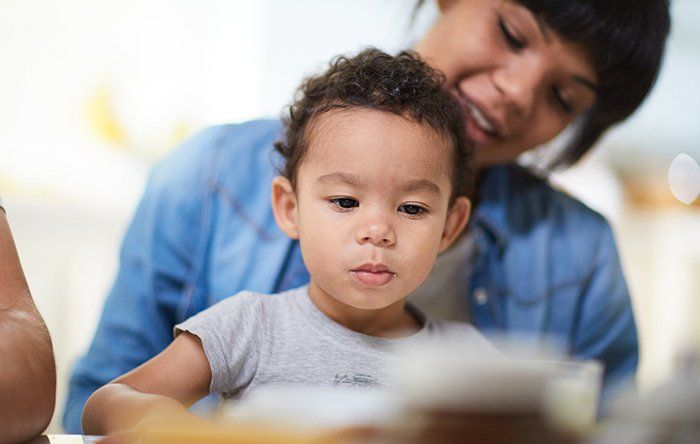Early Intervention for Your Child’s Development
What We Offer

- Early Intervention Services:
- Assistive Technology
- Counseling
- Family Education
- Nursing
- Occupational Therapy
- Physical Therapy
- Family Service Coordination
- Social Work
- Developmental Instruction
- Speech & Language Therapy
- Feeding & Nutrition
In addition to these services, we collaborate with community providers to access health services, transportation, parent support groups, audiology, adaptive equipment, dental, and vision and hearing services. All services are provided in natural environments including the home, day care and community locations which children frequent. We also offer Telahealth services when appropriate.
- Goals of the Program:
- Identify children early who may need some help achieving developmental milestones.
- Provide early support to families when the child’s brain is in rapid growth to make progress during critical periods of development.
- Teach families how to advocate for their children.
- Provide expert care through specialized therapists, nurses, and developmental specialists.
- Provide services in natural environments and in everyday routines in which it is most likely for a child to continue to practice new skills.
- Referrals are received directly from parents, community primary care providers, hospital newborn intensive care units, Early Head Starts, day care providers, school child find programs, other rehabilitation providers, and the statewide referral information line. Parents sign a freedom of choice form to indicate their choice of provider.
- A family service coordinator is assigned at intake to arrange for consents and a Comprehensive Multidisciplinary Evaluation. Eligibility is established after evaluation, according to New Mexico Standards, and, if eligible, the family is offered an Individual Family Service Plan (IFSP).
- Children Who Are Eligible:
- A delay of 25% or more in one or more areas of development.
- An established medical condition which most likely will lead to developmental delays or disabilities.
- Medical risk factors which probably will lead to developmental delays.
- Environmental risk factors which probably will lead to developmental delays.
- Individual Family Service Plan:
The IFSP is developed with the evaluation and provider team, the service coordinator, and the family, with outcomes according to the family’s priorities. Outcomes are family-centered to address daily routines and activities. Supports and services are then provided according to the team’s decisions written into the IFSP. Supports and services may include vision services, hearing services, developmental instruction, physical therapy, occupational therapy, speech and language therapy, nursing, family education and counseling, nutrition and social work. The IFSP is reviewed at least every six months and rewritten annually. The family can request a meeting to make changes at any time. The service coordinator assures that the family is satisfied with progress and services, contacts outside providers for specific needs, and updates the plan as appropriate. Team members communicate through co-treatment, consultation and group planning. Supervision is provided through the Director and Quality Assurance Manager.
- Transition to Preschool
Families are assisted with transition to preschool by the time the child turns two years old. A transition plan is written and signed by the family. A transition conference is planned with the family and the local education agency, and with consent current assessments are sent to the local education agency. Eligibility for preschool special education is determined by the local education agency. Early intervention providers participate at the invitation of the parents in developing the individual education plan. If a child is not eligible for public special education, the service coordinator assists the family in accessing other community services, such as Head Start, private preschool, playgroups, and/or private therapy services after the age of three.
Service Coordinators

Call Today to Speak With Our Director About Your Specific Needs
Contact Us
We will get back to you as soon as possible.
Please try again later.
Contact Us
We will get back to you as soon as possible.
Please try again later.
Early Intervention for Your Child’s Development
What We Offer

- Early Intervention Services:
- Assistive Technology
- Counseling
- Family Education
- Nursing
- Occupational Therapy
- Physical Therapy
- Family Service Coordination
- Social Work
- Developmental Instruction
- Speech & Language Therapy
- Feeding & Nutrition
In addition to these services, we collaborate with community providers to access health services, transportation, parent support groups, audiology, adaptive equipment, dental, and vision and hearing services. All services are provided in natural environments including the home, day care and community locations which children frequent. We also offer Telahealth services when appropriate.
- Goals of the Program:
- Identify children early who may need some help achieving developmental milestones.
- Provide early support to families when the child’s brain is in rapid growth to make progress during critical periods of development.
- Teach families how to advocate for their children.
- Provide expert care through specialized therapists, nurses, and developmental specialists.
- Provide services in natural environments and in everyday routines in which it is most likely for a child to continue to practice new skills.
- Referrals are received directly from parents, community primary care providers, hospital newborn intensive care units, Early Head Starts, day care providers, school child find programs, other rehabilitation providers, and the statewide referral information line. Parents sign a freedom of choice form to indicate their choice of provider.
- A family service coordinator is assigned at intake to arrange for consents and a Comprehensive Multidisciplinary Evaluation. Eligibility is established after evaluation, according to New Mexico Standards, and, if eligible, the family is offered an Individual Family Service Plan (IFSP).
- Children Who Are Eligible:
- A delay of 25% or more in one or more areas of development.
- An established medical condition which most likely will lead to developmental delays or disabilities.
- Medical risk factors which probably will lead to developmental delays.
- Environmental risk factors which probably will lead to developmental delays.
- Individual Family Service Plan:
The IFSP is developed with the evaluation and provider team, the service coordinator, and the family, with outcomes according to the family’s priorities. Outcomes are family-centered to address daily routines and activities. Supports and services are then provided according to the team’s decisions written into the IFSP. Supports and services may include vision services, hearing services, developmental instruction, physical therapy, occupational therapy, speech and language therapy, nursing, family education and counseling, nutrition and social work. The IFSP is reviewed at least every six months and rewritten annually. The family can request a meeting to make changes at any time. The service coordinator assures that the family is satisfied with progress and services, contacts outside providers for specific needs, and updates the plan as appropriate. Team members communicate through co-treatment, consultation and group planning. Supervision is provided through the Director and Quality Assurance Manager.
- Transition to Preschool
Families are assisted with transition to preschool by the time the child turns two years old. A transition plan is written and signed by the family. A transition conference is planned with the family and the local education agency, and with consent current assessments are sent to the local education agency. Eligibility for preschool special education is determined by the local education agency. Early intervention providers participate at the invitation of the parents in developing the individual education plan. If a child is not eligible for public special education, the service coordinator assists the family in accessing other community services, such as Head Start, private preschool, playgroups, and/or private therapy services after the age of three.
Service Coordinators

Call Today to Speak With Our Director About Your Specific Needs
Contact Us
We will get back to you as soon as possible.
Please try again later.
Early Intervention for Your Child’s Development
What We Offer

- Early Intervention Services:
- Assistive Technology
- Counseling
- Family Education
- Nursing
- Occupational Therapy
- Physical Therapy
- Family Service Coordination
- Social Work
- Developmental Instruction
- Speech & Language Therapy
- Feeding & Nutrition
In addition to these services, we collaborate with community providers to access health services, transportation, parent support groups, audiology, adaptive equipment, dental, and vision and hearing services. All services are provided in natural environments including the home, day care and community locations which children frequent. We also offer Telahealth services when appropriate.
- Goals of the Program:
- Identify children early who may need some help achieving developmental milestones.
- Provide early support to families when the child’s brain is in rapid growth to make progress during critical periods of development.
- Teach families how to advocate for their children.
- Provide expert care through specialized therapists, nurses, and developmental specialists.
- Provide services in natural environments and in everyday routines in which it is most likely for a child to continue to practice new skills.
- Referrals are received directly from parents, community primary care providers, hospital newborn intensive care units, Early Head Starts, day care providers, school child find programs, other rehabilitation providers, and the statewide referral information line. Parents sign a freedom of choice form to indicate their choice of provider.
- A family service coordinator is assigned at intake to arrange for consents and a Comprehensive Multidisciplinary Evaluation. Eligibility is established after evaluation, according to New Mexico Standards, and, if eligible, the family is offered an Individual Family Service Plan (IFSP).
- Children Who Are Eligible:
- A delay of 25% or more in one or more areas of development.
- An established medical condition which most likely will lead to developmental delays or disabilities.
- Medical risk factors which probably will lead to developmental delays.
- Environmental risk factors which probably will lead to developmental delays.
- Individual Family Service Plan:
The IFSP is developed with the evaluation and provider team, the service coordinator, and the family, with outcomes according to the family’s priorities. Outcomes are family-centered to address daily routines and activities. Supports and services are then provided according to the team’s decisions written into the IFSP. Supports and services may include vision services, hearing services, developmental instruction, physical therapy, occupational therapy, speech and language therapy, nursing, family education and counseling, nutrition and social work. The IFSP is reviewed at least every six months and rewritten annually. The family can request a meeting to make changes at any time. The service coordinator assures that the family is satisfied with progress and services, contacts outside providers for specific needs, and updates the plan as appropriate. Team members communicate through co-treatment, consultation and group planning. Supervision is provided through the Director and Quality Assurance Manager.
- Transition to Preschool
Families are assisted with transition to preschool by the time the child turns two years old. A transition plan is written and signed by the family. A transition conference is planned with the family and the local education agency, and with consent current assessments are sent to the local education agency. Eligibility for preschool special education is determined by the local education agency. Early intervention providers participate at the invitation of the parents in developing the individual education plan. If a child is not eligible for public special education, the service coordinator assists the family in accessing other community services, such as Head Start, private preschool, playgroups, and/or private therapy services after the age of three.
Family Service Coordinators


